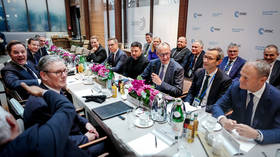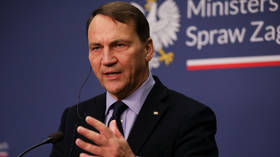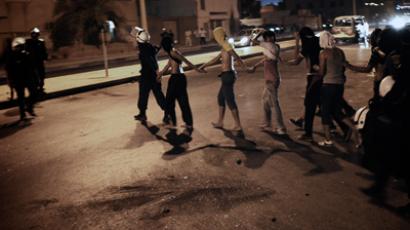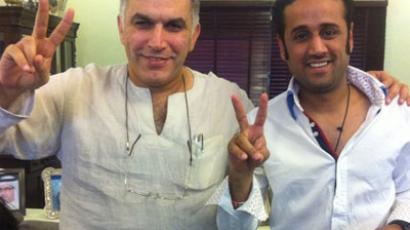Bahraini protesters emboldened by police teargassing (VIDEO)
Bahraini police fired tear gas and stun grenades at hundreds of demonstrators at a pro-democracy protest in the capital, Manama. Thousands joined in for a second march after the initial rally was forcefully dispersed.
Riot police clashed with participants in the "Destination Manama" rallies, which called for the right to self-determination and increased freedoms for the country’s Shiite Muslim majority.Protesters chanted “We want freedom!”, “Democracy!”, “Free Nabeel Rajab!” and even “Down, down, down Hamad!” The last was in reference to King Hamad bin Isa al-Khalifa, the head of Bahrain’s ruling monarchy.A YouTube video from "Destination Manama" showed men and women fleeing security forces as shooting was heard in the background.Bahrain's Interior Ministry, meanwhile, wrote on Twitter that its police had stepped in to restore order after groups of “thugs” began rioting and “hurling Molotov cocktails” at law enforcement.But Sayed Yousif al-Muhafda, from the Bahrain Center for Human Rights, denied the Interior Ministry’s report.“It was a peaceful protest,” al-Muhafda told RT. “All the people were carrying were Bahraini flags. There were no Molotov cocktails. It was witnessed by human rights organizations and journalists."After the first protest was dispersed and arrests were made, demonstrators regrouped and continued their rally.Thousands joined in for the second march, led by main opposition bloc al-Wefaq, Reuters reported. Their slogan was "Stop the shedding of our blood, we will not give up our demands."
Bahrain, which hosts the US Navy’s Fifth fleet, continues to see almost daily demonstrations and clashes.The country's Shiite majority demands a bigger role in running the country, which is controlled by the Sunni al-Khalifa family.At least 50 people have died in nearly 20 months of unrest, with a 16-year-old boy becoming one of the latest victims.Thousands of anti-government activists have been arrested, says the Bahrain Center for Human Rights. This includes human rights activist Nabeel Rajab who, after several detainments, was sentenced to three years in jail for “participation in an illegal assembly” and “calling for a march without prior notification.”
‘US will not tolerate democratic reform in Bahrain’Discussing with RT why the popular uprising in Bahrain does not get as much coverage in the Western media as revolts in Egypt, Libya and other countries, Dominic Kavakeb, from Bahrain's Justice and Development Movement, says the current leaders of Bahrain are viewed as allies in the West, hence the leniency among journalists. The West just wants to keep up al-Khalifa’s rule, he said.“What they don’t realize, however, is that they have huge leverage to convince Bahrain into reforms,” says Kavakeb. “The reality is that when Bahrain is calling for democracy and change, it does not have to be against the West’s interests. It would actually be much more in the interest of the entire world to have a democratic and stable country.”But geopolitical analyst Patrick Henningsen believes the US and other Western countries are looking to sustain the Shiite uprising in Bahrain instead of allowing reforms. He explains it by the high probability that the country's Shiite majority coming to power would not tolerate any confrontation with Iran.“The US will not tolerate any sort of democratic reform or uprising in Bahrain, because they need a hardcore dictatorship in place. There are obviously many military assets they’ve got in the country. They also rely on the Bahraini royal family to support them in Israel, and if not in isolating or positioning to attack Iran, then at least in minimizing the influence the Persian country has in the region,” Henningsen told RT.













